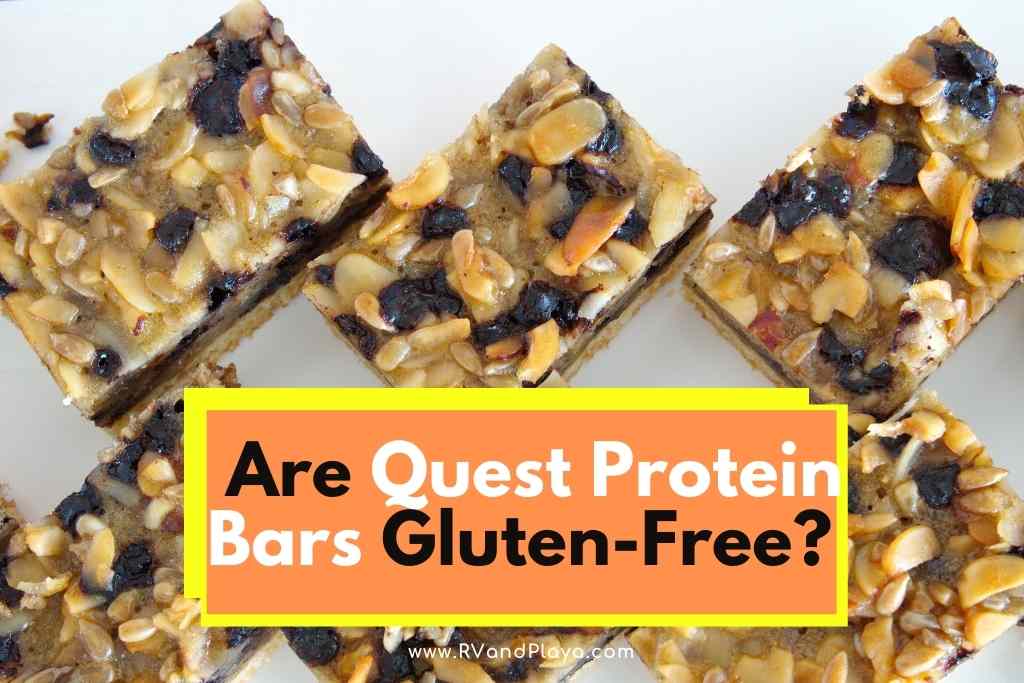Do you know if Quest protein bars are Gluten-free or do Quest bars have gluten? this is one of the questions our readers ask a lot. Well, we´ve got you covered.
Good nutrition and a well-thought-out recovery program are just as important for your workouts as heavy weights and long sessions on the treadmill.
Therefore, once you’ve finished exercising, reach for something rich in protein to help build new muscles—something like a Quest protein bar.
They’re packed full of nutrients you need to recover.
But are Quest protein bars gluten-free? Yes, Quest protein bars are gluten-free and safe for anyone with an allergy or intolerance to gluten. With 21 grams of protein, they’re an excellent dietary supplement for anyone who can’t eat gluten. They’re made from whey protein, sourced from dairy products, along with corn fiber, almond, and natural chocolate flavors.
Keep reading to learn more about gluten, where it comes from, and how it could be sneaking its way into your protein bars.
With a little more knowledge, you’ll be able to eat smarter without triggering your allergy.
Table of Contents
Why Do Some Protein Bars Contain Gluten?
While it’s true that not all protein bars contain gluten, a huge sample of the market does.
It begs the question, then, why do so many protein bars have gluten? The simple answer comes down to their main ingredients.
Many protein bars are built around either an oat or granola base. These ingredients are gluten-rich grains that pack protein bars with calories, nutrients, and, unfortunately, gluten.
While gluten typically acts as a binding agent in most baked goods, it’s more of an unfortunate leftover from grains in most protein bars.
If your protein bars contain any of the following ingredients, they could be inflaming your gluten intolerance:
- Rye
- Barley
- Wheat
- Triticale
Although oats are technically gluten-free, they’re almost always shipped with wheat products that contaminate the oats with gluten.
Therefore, avoid them whenever possible.
Click the link to Amazon and get the Best Gluten-free Quest Protein bars Today!
Is Gluten Always Bad?
Gluten isn’t harmful unless you have an allergy or intolerance to it. Essentially, it’s just a protein that binds together when mixed with water and kneaded into a dough.
As it’s mixed, it creates protein structures that hold baked goods together.
The problem is that some people struggle to digest gluten. When they do, they develop severe side effects, including:
- Sudden onset diarrhea
- Persistent constipation
- Intense bloating and explosive gas
- Sharp and lingering abdominal pain
- General symptoms of irritable bowel syndrome
While some people experience symptoms immediately after consuming gluten—an illness known as Celiac disease—some people can consume gluten for weeks before their symptoms compound into a full-blown reaction.
Read also: Are Kirkland Protein Bars Gluten-Free? (Best Tips!)
What Causes Celiac Disease and Other Gluten Intolerances
In the last twenty years, scientists have discovered a lot of gluten and its effects on the body but they’re still not entirely sure what causes Celiac disease and other gluten intolerances.
Recent research suggests that it’s similar to lactose intolerance—the who suffer from the disease lack an essential enzyme needed to break down the protein.
The problem is, though, that many people don’t develop gluten intolerance until later in life. They may have spent years happily eating bread and gluten products but suddenly develop an intolerance.
This stumped scientists for quite a while but they now believe that the sudden switch has to do with the body’s immune response.
For whatever reason, gluten seems to turn off a specific gene in some adults, causing their immune systems to act aggressively towards the gluten protein.
That immune response often presents as violent diarrhea and gas. For now, though, researchers are continuing to explore this mechanism and hope to someday fix the problem.
Read also: Are Nakd Bars Gluten-Free? (Best Tips!)
Non-Obvious Sources of Gluten in Protein Bars
Although only four grains naturally contain gluten, it has a nefarious way of sneaking into many of the foods we eat every day—even some you wouldn’t expect.
Worst of all, manufacturers aren’t required to label gluten so, if you’re not careful, you can end up ingesting it without meaning to.
As you inspect a potential purchase, keep your eye out for these secret gluten sources:
- Hydrolyzed vegetable proteins are used to imitate meat flavors but often come from wheat
- Maltodextrin and dextrin are flavor enhancers made from wheat
- Modified vegetable starches help with texture but come from barley
- Many artificial and natural flavorings are made from barley
Additionally, manufacturers may use the scientific names for grains, including:
- Triticum spelta (spelt flour)
- Triticum vulgare (wheat)
- Triticale (a wheat and rye crossbreed)
- Secale cereale (rye)
- Hordeum vulgare (barley)
Are Quest Protein Bars Gluten-Free?
You can avoid accidentally consuming gluten by switching the Quest protein bars. They are a gluten- and soy-free source of protein, perfect for your post-workout recovery plan.
Rather than relying on gluten-heavy grains, Quest protein bars are made with whey protein and nuts.
They maintain their structure thanks to soluble corn fibers, which are 100% gluten-free. Best of all, they’re deliciously flavored with chocolate, almond, and other natural ingredients.
With over 10 different flavors, you’re sure to find one that matches your taste. Pick them up today at your nearest grocery store or supplement shop.
Here are some of my favorite services, products, and Stores
There are affiliate links, so if you do decide to use any of them, I´ll earn a small commission. But in all honesty, these are the exact what I use and recommend to everyone, even my own family.
To see all my of most up-to-date recommendations, check out this resource that I made for you!
+ Products & Services
+ Convenience Stores
+ Save Thousands of Dollars
References
https://www.hsph.harvard.edu/nutritionsource/gluten
Recent Posts
Are Pure Protein Bars Gluten-Free? (What You´ll Never Imagine)
Do you know if Pure protein bars are gluten-free? this is one of the questions our readers ask a lot. Well, we´ve got you covered. After a workout, you need a quick punch of protein to help your...
Do you know if Herbalife protein bars are Gluten-free? this is one of the questions our readers ask a lot. Well, we´ve got you covered. Herbalife protein bars are a tasty snack perfect for...


